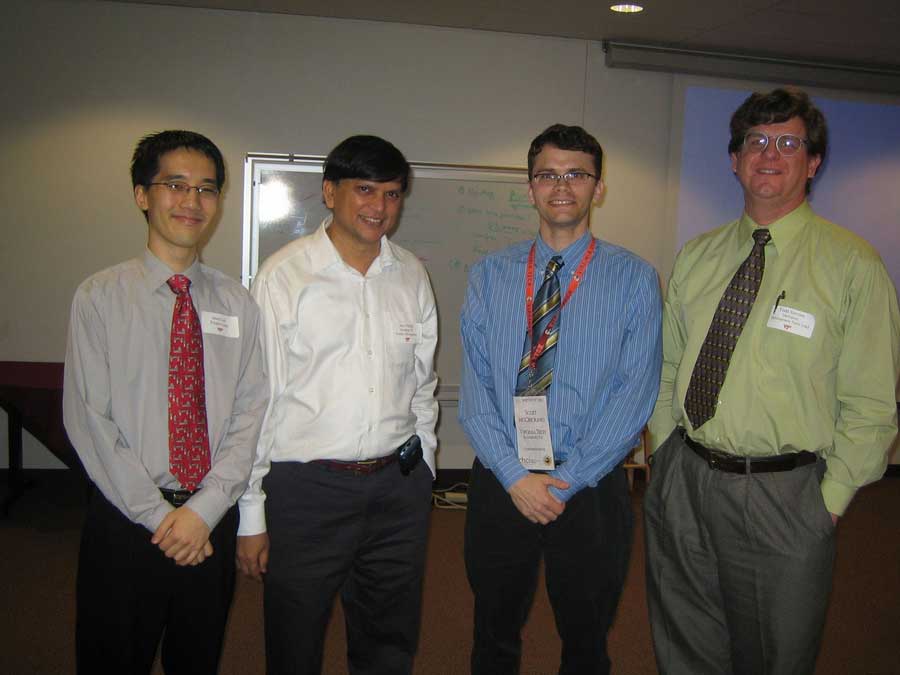Virginia Tech and Meridium Inc. receive NSF grant for agile software usability project

Scott McCrickard, associate professor of computer science at Virginia Tech; and Todd Stevens, development team leader at Meridium Inc., the leader in asset performance management software and consulting solutions; recently received a National Science Foundation Small Business Technology Transfer grant of $150,000.
The grant is for the first phase of a software research and development project called "Integrating scenario-based usability engineering and agile software development practices."
“Usability engineering” focuses on how to design interfaces that meet the end-user’s needs in terms of utility, efficiency, and ease of use. “Agile software development” is an approach to software engineering that utilizes highly collaborative teams working in an iterative development process to deliver software that meets the changing needs of customers. “Often, agile teams develop software without considering usability, [which results] in software systems that meet functional, budgetary, and scheduling requirements but […] can be difficult or frustrating for end-users,” McCrickard said.
This research project will identify key interactions, communication mechanisms, and design representations that can enable the successful integration of usability into agile processes. Stevens said Meridium’s goal is to deliver more usable, value-added software to customers, and the company hopes to foster a closer, more effective collaboration thus helping to reduce the need for excessive customer support calls and improve customer satisfaction and retention.
Jason Chong Lee, a Virginia Tech Ph.D. candidate who is working part time at Meridium, will help plan and coordinate this joint effort as a component of his dissertation work.
“We see this as a unique opportunity to apply and further our goal of developing ways to integrate usability engineering models and techniques into an agile software development environment,” said McCrickard. “We look forward to continuing collaborations with Meridium as we work to strengthen ties between research and industry to foster the mutually beneficial transfer of knowledge and experience.”
To better support the research project and to leverage Virginia Tech’s expertise in software development and risk management, Meridium has opened an office in Blacksburg at Virginia Tech’s Corporate Research Center, a growing research park for high-technology companies. The new Meridium office will host both Virginia Tech interns as well as full time Meridium employees engaged in a variety of software development projects.
“I'm happy to be working with the Virginia Tech faculty on an important aspect of software engineering. It is my hope that, in securing this grant and opening a Meridium office in Blacksburg, we will have more opportunities for collaboration with the Virginia Tech computer science, as well as other departments’ faculty. I am currently engaging some other faculty members in discussions about potential research areas and topics, as well as other collaboration mechanisms," said Stevens, a Virginia Tech alumnus.
Bonz Hart, president and chief executive officer of Meridium, said: “We’re pleased to be working with a top-tier university like Virginia Tech on this important research. We have been moving toward this type of relationship with Virginia Tech’s Computer Science Department for years. We’re looking forward to generating new ideas, sharing knowledge, building experience and connecting academics with industry to find creative and innovative ways of working with our software to solve problems for the clients and industries we serve.”
About the computer science department at Virginia Tech
The Department of Computer Science at Virginia Tech was established in 1971 and is part of the College of Engineering, the premier engineering school in the Commonwealth of Virginia. The college has a history of innovation, including cost-effective supercomputing (System X) and entrepreneurial research innovation, leading to three new buildings for research in critical technologies and applied science.
The Department of Computer Science is distinguished by interdisciplinary research in high-end computing systems, computational biology and bioinformatics, and human-computer interaction as well as core areas in computing. The graduate program, offering M.S. and Ph.D. degrees in Blacksburg and at the Northern Virginia Center, was ranked among the top 30 programs as measured by the most recent study of Ph.D.s awarded. The graduates of the accredited undergraduate program are highly sought by industry and well prepared for further study.




.jpg.transform/m-medium/image.jpg)